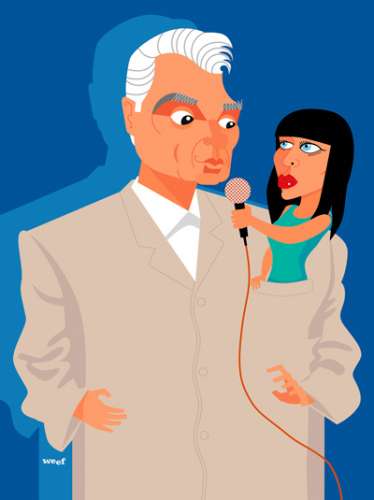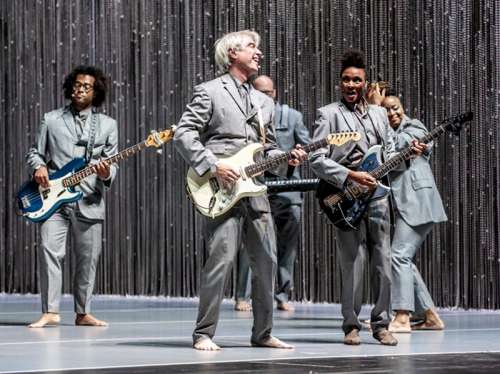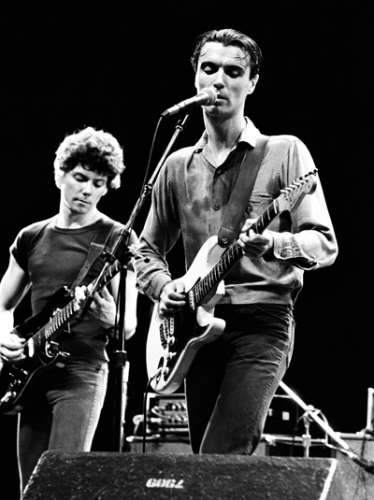David Byrne talks to Kimbra about life as a musical polymath
Via Noted

David Byrne and Kimbra. Illustration/Weef
By The Listener
David Byrne is returning to New Zealand to perform American Utopia, a show that has won acclaim for its theatricality and how it marries the past music of the one-time Talking Heads frontman to his adventurous solo career. Opening his three concerts will be Kimbra, who performed with Byrne in a 2016 live tribute to David Bowie at the Rock and Roll Hall of Fame in Cleveland, Ohio. When the Listener was told Byrne, who is 66, wasn’t doing interviews, we asked the 28-year-old Kiwi Grammy winner if she could persuade him to talk to her about his life, music, books and memories of past visits here. She did …
Kimbra: We performed together in a David Bowie tribute. What did Bowie mean to you? Obviously, there was a connection, with both of you working with Brian Eno, but is there a period of Bowie’s work that you particularly hold dear? On a side note, I think the craziest part of that night for me was after the show, when we were driving to get dinner and you said the last time you had been at a Rock and Roll Hall of Fame induction ceremony was when you were inducting David Bowie alongside Madonna. I had to pinch myself a little at that moment …
DB: The other DB was a huge inspiration well before the Eno connection. I remember hanging around art school in the early 70s dressing as best I could on a limited budget as a glam-rock star. I made my own leather trousers as new ones were way too expensive – I knew how to sew! – but didn’t factor in that leather stretches to fit the, um, body. So there were what we’d call knee pooches and such. It was pretty sad.
I realised early on I’d never make a convincing glam-rock star, and I wasn’t even sure I’d have a musical career, but DB certainly liberated our thinking back in the day. I was musically inspired by DB but knew better than to emulate anyone directly … though we did ask Eno, “How did you get that drum sound on Low?’”
K: I found your work with St Vincent hugely inspiring. Who are some other artists you’re inspired by who are perhaps up and coming or just making their mark?
DB: I’ve been on tour since March, so I haven’t had time to be as current as I like … but here goes. The new Dirty Projectors, one of my favourite artists, is very good; Christine and the Queens … it’s obvious I like a bit of movement on stage, and she does it wonderfully.
The support acts that have joined me on this tour (that means you, too!) have been great to hear live and meet – Perfume Genius, Tune-Yards, Ibeyi, Benjamin Clementine, Topaz Jones, Maria Rodés, Karina Zeviani, Mexican Institute of Sound and Lisandro Aristimuño.

Photo: Getty Images
K: What did you think of Angélique Kidjo’s new album covering Talking Heads’ Remain in Light? Is there an album by an artist you’d ever consider covering? We’ve talked before about our shared interest in the spiritual jazz era and Sufi music and I know you have a deep interest in music from different parts of the world.
DB: I saw Angélique perform the Remain in Light show here in New York – it was wonderful … she made the songs her own, and added bridges and transitional music between the songs, mostly in Yoruba. I haven’t heard the record yet.
I’m covering a Janelle Monáe song now on tour – it’s not one that’s on any of her albums. Hell You Talmbout is the name of the song. It’s one of the most powerful and moving protest songs I’ve ever heard.
K: You’ve been to New Zealand a few times over the decades – Talking Heads toured here in 1979 and was a headliner at Sweetwaters in 1984, so at quite different times in the band’s evolution. What do you remember of those early band visits?
DB: I don’t remember the shows so much but I remember the extracurricular activities. One tour we went swimming, possibly not too far from Auckland, and I got caught in a rip and was fairly terrified. Nothing bad happened, but I learnt my lesson. On another tour, I convinced some other band and crew members to arrive early and visit Rotorua and then go down and do the Tongariro Crossing, which was exhausting but spectacular. Last tour, some of us had dinner at Neil and Sharon Finn’s house – it was great to hang out, and the food was good, too.
K: American Utopia has been compared to the theatricality of Talking Heads’ Stop Making Sense period, which Kiwis saw at Sweetwaters. What do you think?
DB: It’s dangerous to make comparisons, but there are some similarities. Both shows are what one might call “high concept” – they take one fairly simple idea and let it play out. The idea might be technically simple – in this case we have a completely empty stage with all the musicians mobile – but behind the scenes it’s pretty tricky. That said, it doesn’t seem like a tech-heavy show. The tech is all invisible.
K: You’ve lived in New York through many defining eras of culture and music. What year would you say encapsulates your favourite memories of the city?
DB: I’m not very nostalgic – one of the most recent New York moments was the Afropunk Festival I attended as an audience member. Great vibe, good music, crazy clothes.
K: The thing I admire about you most is your endless curiosity, an almost child-like inquisitiveness that leads you to follow your nose down fascinating rabbit holes. This has always been clear in your music but also in you as a person in the times we’ve hung out. What methods, rituals or practices do you follow to ensure you remain open to the world?
DB: I’ve heard other people say this to me and, to be honest, I don’t know how to be otherwise. There’s so much that is interesting, moving and exciting in the world that I don’t know about – there are endless discoveries … there are many people doing strange and often wonderful creative things.

K: We’ve both been drawn to the world of musical theatre, and the format of focusing on narrative before production or even song craft. What’s the pull for you?
DB: I’ve written two musicals, and for a songwriter, a story and character is a great prod to writing. It’s liberating not to be writing about oneself and to have a clear directive – “This is what the song has to say and this is what the character is feeling” – to take a character’s point of view. I may not agree with their point of view, but we can all empathise with others’ drives and feelings, even if we disagree with how they respond to those psychological forces. One musical was about former Philippines First Lady Imelda Marcos. She was born on the poorer side of a powerful and well-connected family, and felt excluded from Filipino “society” as a result. Much of what drove her and fired her ambition was this pain at being excluded and rejected. Well, we all know that feeling, we have all had it. But we all don’t get to play it out on a world stage. I got to write songs that are sentimental or heartbreaking for musicals that I would never write for myself. I wrote to [Bowie] as I was writing and told him how exciting and liberating I thought the experience was. But to be clear, I am not a musical-theatre person. I don’t know all the conventions and hate the typical singing style, but I could see that having songs help tell an emotional story, well, who knows? There might be a new way to do that other than [using] the musical-theatre conventions, which are pretty corny.
K: Your 2012 book How Music Works said “this is not an autobiographical account of my life as a singer and musician”. Why did you write it the way you did?
DB: There are a lot of “behind the music” rock-star bios out there – a few of them were even written by the artists themselves. We don’t need another one of those, and besides, for me it’s more interesting to wonder in a more general way why music sounds the way it does – not just my music, but lots of music. As I began accumulating chapters, I realised it had a theme – context matters. My hope is that it might be enjoyable and useful even for people who don’t know me or care about my music.
K: What is the best book you’ve read this year?
DB: Other Minds – the book about octopi, a different kind of intelligence.
K: You’ve also written about your love of cycling. Will you be bringing a bicycle to New Zealand?
DB: That depends on the freight situation, but I sure hope to be able to ride around Auckland, Wellington and Christchurch.
K: And can I invite you to continue our African food scouting tradition and hunt down some Ethiopian while on tour? I know of two spots in Wellington ...
DB: Ha ha, we had this conversation – I’ll be happy to try Wellington Ethiopian, but might opt for local seafood first!
K: I want a David Byrne mixtape on this tour, please. Swapsies?
DB: Of course. FYI, I do a monthly streaming radio playlist. Each one is about two hours long and they vary in theme from month to month. My website has it, as do SoundCloud and streaming services.
David Byrne’s American Utopia tour (supported by Kimbra) is at TSB Arena, Wellington (sold out) November 13; Horncastle Arena, Christchurch, November 15; Spark Arena Auckland, November 17.